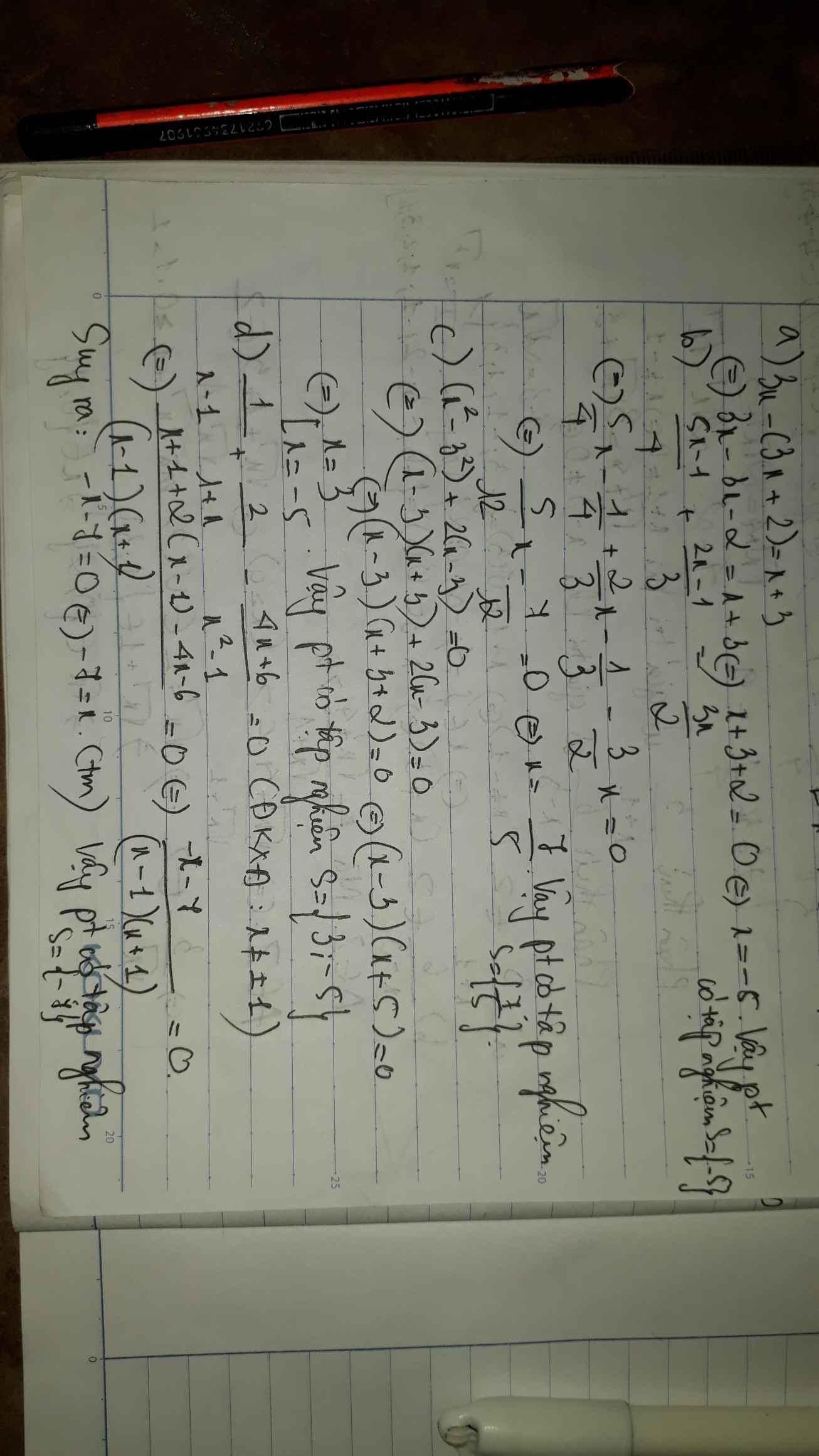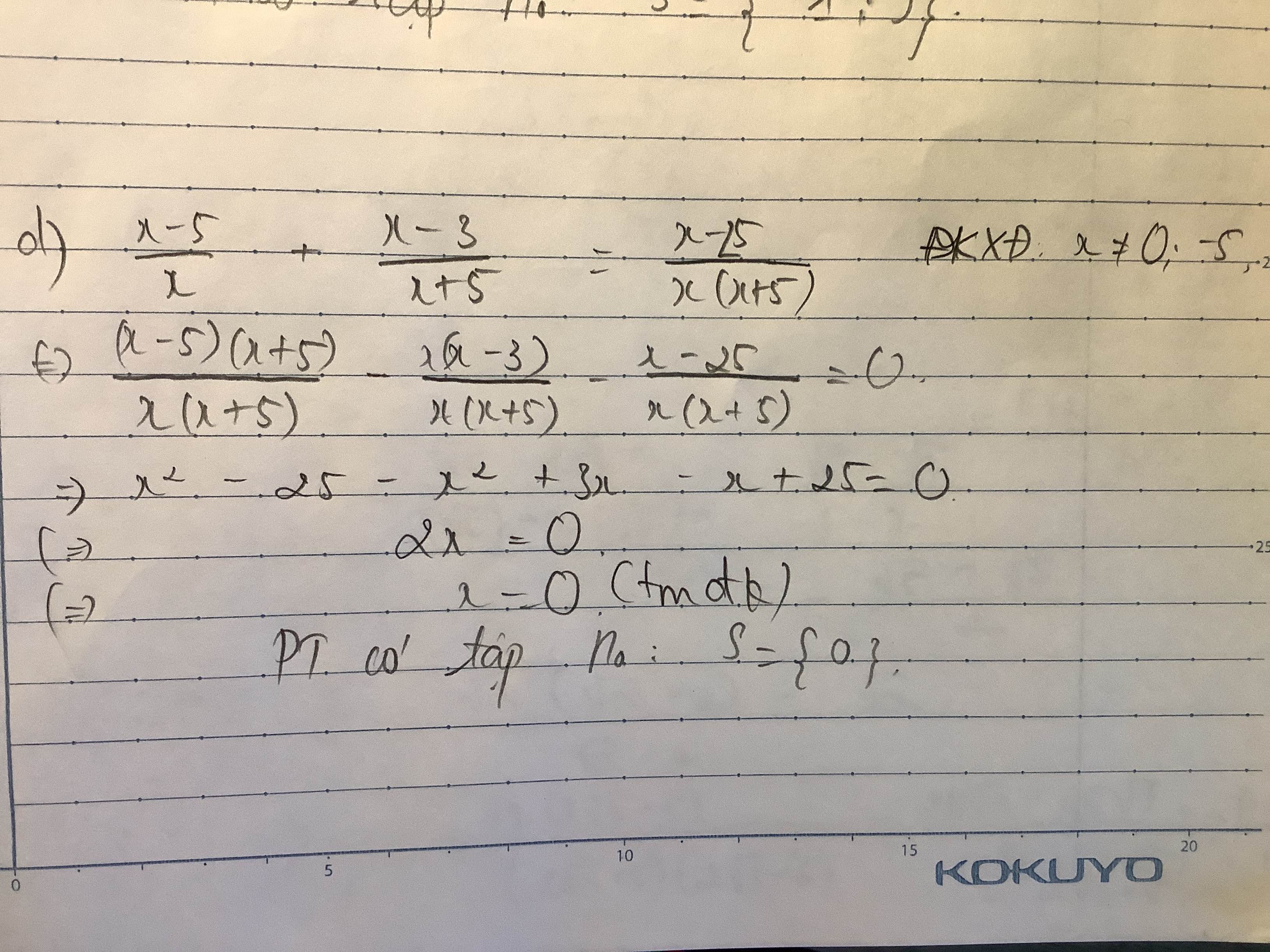Hãy nhập câu hỏi của bạn vào đây, nếu là tài khoản VIP, bạn sẽ được ưu tiên trả lời.

a) Ta có: \(x^2-2x+1=0\)
\(\Leftrightarrow\left(x-1\right)^2=0\)
\(\Leftrightarrow x-1=0\)hay x=1
Vậy: S={1}
c) Ta có: \(x+x^4=0\)
\(\Leftrightarrow x\left(x^3+1\right)=0\)
\(\Leftrightarrow x\left(x+1\right)\left(x^2-x+1\right)=0\)
mà \(x^2-x+1>0\forall x\)
nên x(x+1)=0
\(\Leftrightarrow\left[{}\begin{matrix}x=0\\x+1=0\end{matrix}\right.\Leftrightarrow\left[{}\begin{matrix}x=0\\x=-1\end{matrix}\right.\)
Vậy: S={0;-1}

a, <=> (x-1)^3 + x^2(x-1)=0
<=> (x-1)(x^2-2x+1+x^2)=0
<=> (x-1)(2x^2-2x+1)=0
=> x=1
2x^2-2x+1=0 (*)
giải (*):
2x^2-2x+1=0
<=> (x-1)^2 + x^2 > 0
=> * vô nghiệm
=> Pt có nghiệm là 1.
b, x^2+x-12=0
<=> (x-3)(x+4)=0
=> x=3 hoặc x = -4
vậy....
c, 6x^2-11x-10=0
<=> (x-5/2)(6x+4)=0
=> x=5/2 hoặc x= -2/3.
vậy...

a) \(2\chi-3=3\left(\chi+1\right)\)
\(\Leftrightarrow2\chi-3=3\chi+3\)
\(\Leftrightarrow2\chi-3\chi=3+3\)
\(\Leftrightarrow\chi=-6\)
Vậy phương trình có tập nghiệm S= \(\left\{-6\right\}\)
\(3\chi-3=2\left(\chi+1\right)\)
\(\Leftrightarrow3\chi-3=2\chi+2\)
\(\Leftrightarrow3\chi-2\chi=2+3\)
\(\Leftrightarrow\chi=5\)
Vậy phương trình có tập nghiệm S= \(\left\{5\right\}\)
b) \(\left(3\chi+2\right)\left(4\chi-5\right)=0\)
\(\Leftrightarrow\left[{}\begin{matrix}3\chi+2=0\\4\chi-5=0\end{matrix}\right.\)
\(\Leftrightarrow\left[{}\begin{matrix}3\chi=-2\\4\chi=5\end{matrix}\right.\)
\(\Leftrightarrow\left[{}\begin{matrix}\chi=\dfrac{-2}{3}\\\chi=\dfrac{5}{4}\end{matrix}\right.\)
Vậy phương trình có tập nghiệm S= \(\left\{\dfrac{-2}{3};\dfrac{5}{4}\right\}\)
\(\left(3\chi+5\right)\left(4\chi-2\right)=0\)
\(\Leftrightarrow\left[{}\begin{matrix}3\chi+5=0\\4\chi-2=0\end{matrix}\right.\)
\(\Leftrightarrow\left[{}\begin{matrix}3\chi=-5\\4\chi=2\end{matrix}\right.\)
\(\Leftrightarrow\left[{}\begin{matrix}\chi=\dfrac{-5}{3}\\\chi=\dfrac{1}{2}\end{matrix}\right.\)
Vậy phương trình có tập nghiệm S= \(\left\{\dfrac{-5}{3};\dfrac{1}{2}\right\}\)
c) \(\left|\chi-7\right|=2\chi+3\)
Trường hợp 1:
Nếu \(\chi-7\ge0\Leftrightarrow\chi\ge7\)
Khi đó:\(\left|\chi-7\right|=2\chi+3\)
\(\Leftrightarrow\chi-7=2\chi+3\)
\(\Leftrightarrow\chi-2\chi=3+7\)
\(\Leftrightarrow\chi=-10\) (KTMĐK)
Trường hợp 2:
Nếu \(\chi-7\le0\Leftrightarrow\chi\le7\)
Khi đó: \(\left|\chi-7\right|=2\chi+3\)
\(\Leftrightarrow-\chi+7=2\chi+3\)
\(\Leftrightarrow-\chi-2\chi=3-7\)
\(\Leftrightarrow-3\chi=-4\)
\(\Leftrightarrow\chi=\dfrac{4}{3}\)(TMĐK)
Vậy phương trình có tập nghiệm S=\(\left\{\dfrac{4}{3}\right\}\)
\(\left|\chi-4\right|=5-3\chi\)
Trường hợp 1:
Nếu \(\chi-4\ge0\Leftrightarrow\chi\ge4\)
Khi đó: \(\left|\chi-4\right|=5-3\chi\)
\(\Leftrightarrow\chi-4=5-3\chi\)
\(\Leftrightarrow\chi+3\chi=5+4\)
\(\Leftrightarrow4\chi=9\)
\(\Leftrightarrow\chi=\dfrac{9}{4}\)(KTMĐK)
Trường hợp 2: Nếu \(\chi-4\le0\Leftrightarrow\chi\le4\)
Khi đó: \(\left|\chi-4\right|=5-3\chi\)
\(\Leftrightarrow-\chi+4=5-3\chi\)
\(\Leftrightarrow-\chi+3\chi=5-4\)
\(\Leftrightarrow2\chi=1\)
\(\Leftrightarrow\chi=\dfrac{1}{2}\)(TMĐK)
Vậy phương trình có tập nghiệm S=\(\left\{\dfrac{1}{2}\right\}\)

a: Sửa đề: \(\left(2x^2-3x-1\right)^2-3\left(2x^2-3x-5\right)-16=0\)
\(\Leftrightarrow\left(2x^2-3x-1\right)^2-3\left(2x^2-3x-1-4\right)-16=0\)
\(\Leftrightarrow\left(2x^2-3x-1\right)^2-3\left(2x^2-3x-1\right)-4=0\)
\(\Leftrightarrow\left(2x^2-3x-1-4\right)\left(2x^2-3x-1+1\right)=0\)
\(\Leftrightarrow\left(2x^2-3x-5\right)\left(2x^2-3x\right)=0\)
\(\Leftrightarrow\left(2x^2-5x+2x-5\right)\cdot x\cdot\left(2x-3\right)=0\)
\(\Leftrightarrow\left(2x-5\right)\left(x+1\right)x\left(2x-3\right)=0\)
hay \(x\in\left\{\dfrac{5}{2};-1;0;\dfrac{3}{2}\right\}\)
b: \(\Leftrightarrow\left(x^2+x\right)^2+4\left(x^2+x\right)-12=0\)
\(\Leftrightarrow\left(x^2+x+6\right)\left(x^2+x-2\right)=0\)
\(\Leftrightarrow\left(x+2\right)\left(x-1\right)=0\)
hay \(x\in\left\{-2;1\right\}\)

a) Ta có: \(\left(2x-3\right)^2=\left(2x-3\right)\left(x+1\right)\)
\(\Leftrightarrow\left(2x-3\right)^2-\left(2x-3\right)\left(x+1\right)=0\)
\(\Leftrightarrow\left(2x-3\right)\left(2x-3-x-1\right)=0\)
\(\Leftrightarrow\left(2x-3\right)\left(x-4\right)=0\)
\(\Leftrightarrow\left[{}\begin{matrix}2x-3=0\\x-4=0\end{matrix}\right.\Leftrightarrow\left[{}\begin{matrix}2x=3\\x=4\end{matrix}\right.\Leftrightarrow\left[{}\begin{matrix}x=\dfrac{3}{2}\\x=4\end{matrix}\right.\)
Vậy: \(S=\left\{\dfrac{3}{2};4\right\}\)
b) Ta có: \(x\left(2x-9\right)=3x\left(x-5\right)\)
\(\Leftrightarrow x\left(2x-9\right)-3x\left(x-5\right)=0\)
\(\Leftrightarrow x\left(2x-9\right)-x\left(3x-15\right)=0\)
\(\Leftrightarrow x\left(2x-9-3x+15\right)=0\)
\(\Leftrightarrow x\left(6-x\right)=0\)
\(\Leftrightarrow\left[{}\begin{matrix}x=0\\6-x=0\end{matrix}\right.\Leftrightarrow\left[{}\begin{matrix}x=0\\x=6\end{matrix}\right.\)
Vậy: S={0;6}
c) Ta có: \(3x-15=2x\left(x-5\right)\)
\(\Leftrightarrow3\left(x-5\right)-2x\left(x-5\right)=0\)
\(\Leftrightarrow\left(x-5\right)\left(3-2x\right)=0\)
\(\Leftrightarrow\left[{}\begin{matrix}x-5=0\\3-2x=0\end{matrix}\right.\Leftrightarrow\left[{}\begin{matrix}x=5\\2x=3\end{matrix}\right.\Leftrightarrow\left[{}\begin{matrix}x=5\\x=\dfrac{3}{2}\end{matrix}\right.\)
Vậy: \(S=\left\{5;\dfrac{3}{2}\right\}\)
d) Ta có: \(\dfrac{5-x}{2}=\dfrac{3x-4}{6}\)
\(\Leftrightarrow6\left(5-x\right)=2\left(3x-4\right)\)
\(\Leftrightarrow30-6x=6x-8\)
\(\Leftrightarrow30-6x-6x+8=0\)
\(\Leftrightarrow-12x+38=0\)
\(\Leftrightarrow-12x=-38\)
\(\Leftrightarrow x=\dfrac{19}{6}\)
Vậy: \(S=\left\{\dfrac{19}{6}\right\}\)
e) Ta có: \(\dfrac{3x+2}{2}-\dfrac{3x+1}{6}=2x+\dfrac{5}{3}\)
\(\Leftrightarrow\dfrac{3\left(3x+2\right)}{6}-\dfrac{3x+1}{6}=\dfrac{12x}{6}+\dfrac{10}{6}\)
\(\Leftrightarrow6x+4-3x-1=12x+10\)
\(\Leftrightarrow3x+3-12x-10=0\)
\(\Leftrightarrow-9x-7=0\)
\(\Leftrightarrow-9x=7\)
\(\Leftrightarrow x=-\dfrac{7}{9}\)
Vậy: \(S=\left\{-\dfrac{7}{9}\right\}\)

1, x(x-1)=2(x-1)
<=> x(x-1)-2(x-1)=0
<=> (x-2)(x-1)=0
<=>x=2 hoặc x=1
vậy ...
2, (x+2)(2x-3)=x^2 -4
<=>(x+2)(2x-3)=(x-2)(x+2)
<=> (x+2)(2x-3)-(x-2)(x+2)=0
<=> (x+2)(2x-3-x+2)=0
<=> x=-2 hoặc x=1
vây...
3,x^2 +3x +2=0
<=> x^2 +x+2x+2=0
<=>(x+2)(x+1)=0
<=> x=-2 hoặc x=-1
vậy ...
5, x^3+x^2-12x =0
<=> x(x^2+x-12)=0
<=>x(x^2-3x+4x-12)=0
<=>x(x+4)(x-3)=0
<=> x=0 hoặc x=-4 hoặc x=3
vậy ...

a: Ta có: \(3x-\left(3x+2\right)=x+3\)
\(\Leftrightarrow x+3=-2\)
hay x=-5
b: Ta có: \(\dfrac{5x-1}{4}+\dfrac{2x-1}{3}=\dfrac{3x}{2}\)
\(\Leftrightarrow15x-3+8x-4=18x\)
\(\Leftrightarrow5x=7\)
hay \(x=\dfrac{7}{5}\)

Với \(x=0\) không phải nghiệm
Với \(x\ne0\) chia 2 vế cho \(x^2\), pt tương đương:
\(2x^2+3x-1+\dfrac{3}{x}+\dfrac{2}{x^2}=0\)
\(\Leftrightarrow2\left(x+\dfrac{1}{x}\right)^2+3\left(x+\dfrac{1}{x}\right)-5=0\)
\(\Leftrightarrow\left[{}\begin{matrix}x+\dfrac{1}{x}=1\\x+\dfrac{1}{x}=-\dfrac{5}{2}\end{matrix}\right.\)
\(\Leftrightarrow\left[{}\begin{matrix}x^2-x+1=0\\2x^2+5x+2=0\end{matrix}\right.\)
\(\Leftrightarrow\left[{}\begin{matrix}\left(x-\dfrac{1}{2}\right)^2+\dfrac{3}{4}=0\left(vô-nghiệm\right)\\\left(x+2\right)\left(2x+1\right)=0\end{matrix}\right.\)
\(\Leftrightarrow\left[{}\begin{matrix}x=-2\\x=-\dfrac{1}{2}\end{matrix}\right.\)
Câu a chắc là đề sai, vì nghiệm vô cùng xấu, tử số của phân thức cuối cùng là \(x+17\) mới hợp lý
b.
Đặt \(x+3=t\)
\(\Rightarrow\left(t+1\right)^4+\left(t-1\right)^4=14\)
\(\Leftrightarrow t^4+6t^2-6=0\) (đến đây đoán rằng bạn tiếp tục ghi sai đề, nhưng thôi cứ giải tiếp)
\(\Rightarrow\left[{}\begin{matrix}t^2=-3+\sqrt{15}\\t^2=-3-\sqrt{15}\left(loại\right)\end{matrix}\right.\)
\(\Rightarrow t=\pm\sqrt{-3+\sqrt{15}}\Rightarrow x=-3\pm\sqrt{-3+\sqrt{15}}\)
Câu c chắc cũng sai đề, vì lên lớp 8 rồi không ai cho đề kiểu này cả, người ta sẽ rút gọn luôn số 1 bên trái và 60 bên phải.

a: Ta có: \(4x-2\left(1-x\right)=5\left(x-4\right)\)
\(\Leftrightarrow4x-2+2x=5x-20\)
\(\Leftrightarrow x=-18\)
b: Ta có: \(\dfrac{x}{6}+\dfrac{1-3x}{9}=\dfrac{-x+1}{12}\)
\(\Leftrightarrow6x+4\left(1-3x\right)=3\left(-x+1\right)\)
\(\Leftrightarrow6x+4-12x=-3x+3\)
\(\Leftrightarrow-3x=-1\)
hay \(x=\dfrac{1}{3}\)
c: Ta có: \(\left(x+2\right)^2-3\left(x+2\right)=0\)
\(\Leftrightarrow\left(x+2\right)\left(x-1\right)=0\)
\(\Leftrightarrow\left[{}\begin{matrix}x=-2\\x=1\end{matrix}\right.\)


a) pt <=> ( x - 1 )3 + x2( x - 1 ) = 0
<=> ( x - 1 )[ ( x - 1 )2 + x2 ] = 0
<=> x = 1
Vậy pt có nghiệm x = 1
b) x2 + x - 12 = 0
<=> x2 - 3x + 4x - 12 = 0
<=> x( x - 3 ) + 4( x - 3 ) = 0
<=> ( x - 3 )( x + 4 ) = 0
<=> x = 3 hoặc x = -4
Vậy S = { 3 ; -4 }
c) x + x4 = 0
<=> x( x3 + 1 ) = 0
<=> x( x + 1 )( x2 - x + 1 ) = 0
<=> x = 0 hoặc x = -1
Vậy S = { 0 ; -1 }
a,\(x^3-3x^2+3x-1+x\left(x^2-x\right)=0\)
\(\Leftrightarrow\left(x^3-3x^2+3x-1\right)+x\left(x^2-x\right)=0\)
\(\Leftrightarrow\left(x-1\right)^3+x^2\left(x-1\right)=0\)
\(\Leftrightarrow\left(x-1\right)\left[\left(x-1\right)^2+x^2\right]=0\)
\(\Leftrightarrow x=1\)